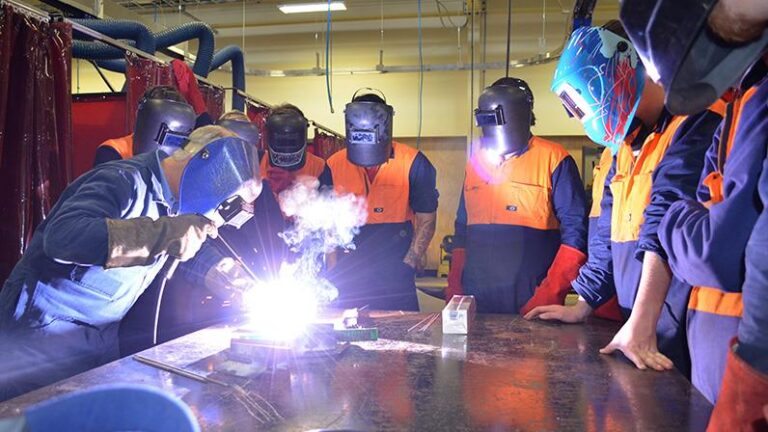Entry-Level Trade Jobs: Unlock Your Career Potential with Hands-On Roles
Anúncios
Are you exploring **entry-level trade jobs**? Discover how these hands-on roles can jumpstart your career with minimal barriers to entry. From understanding the top industries to essential skills and necessary certifications, this article will guide you through beginning a rewarding career in trade. Whether you’re seeking your first job or considering a career shift, entry-level trade jobs provide a promising pathway.
Understanding Entry-Level Trade Jobs
Entry-level trade jobs offer an exciting gateway into various industries for those eager to work with their hands and learn on the job. These roles are crucial as they require little to no formal education, making them accessible to many. From carpentry and plumbing to electrical work and welding, these positions provide a solid foundation for building a lasting career.
Diversification in trade jobs illustrates their importance as they cater to numerous sectors. The demand for skilled tradespeople remains consistently high, ensuring job security and potential growth. Furthermore, with technological advancements, trade roles are evolving, opening new opportunities within the field.
Aspirants in entry-level trade roles often start as apprentices or assistants. This on-the-job training lets workers acquire necessary skills and experience while earning a wage. Employers value the hands-on experience, which elevates a candidate’s employability and expertise.
Entry-level positions frequently include functions like assisting seasoned professionals, handling tools, and performing routine tasks under supervision. The exposure to real-world scenarios enables workers to transition into more complex roles successfully.
Advantages of Trade Jobs
Beyond job security, entry-level trade positions can lead to financial stability. With the right skills and experience, tradespeople can progress to higher-paying roles or even start their own businesses. The path from entry-level to skilled expert offers a clear, rewarding trajectory for ambitious individuals.
Top Industries Hiring for Entry-Level Trade Jobs

Many industries are actively seeking candidates for entry-level trade jobs, offering diverse opportunities across sectors. The construction industry is a significant employer, needing workers for roles like carpentry, masonry, and HVAC installation. These jobs are vital for building homes, offices, and infrastructure, ensuring a steady demand for fresh talent.
The manufacturing sector also plays a critical role in hiring entry-level personnel, where roles such as machinists, welders, and assembly line workers are essential. As production technology evolves, these roles provide an exciting blend of traditional skills and modern innovation.
Automotive trades are another lucrative field for entry-level positions. Workers can train as mechanics, helping to repair and maintain vehicles. As people continue to rely heavily on cars, these jobs remain crucial to the transportation industry.
Healthcare and Renewable Energy
The healthcare sector offers roles in medical equipment repair and maintenance, which do not require extensive prior experience but provide crucial support to medical facilities.
The growing renewable energy industry is also a promising avenue for entry-level trade jobs. Opportunities to work on solar and wind energy projects are expanding, providing workers the chance to contribute to sustainable energy solutions.
Across these industries, entry-level trade roles underpin vital operations, offering stability and career progress to dedicated individuals.
Essential Skills for Entry-Level Trade Jobs
In entry-level trade jobs, developing certain skills can significantly boost your ability to succeed and grow in your career. Technical skills are fundamental, as they allow you to understand and operate industry-specific tools and machinery. Gaining proficiency in these areas makes tasks more manageable and efficient.
Another crucial skill is problem-solving. Trades often present unexpected challenges that require quick thinking and innovative solutions. Being able to assess situations and troubleshoot effectively makes you a valuable asset in any trade environment.
Attention to detail ensures that tasks are completed accurately and safely. Whether it’s measuring materials precisely or ensuring machinery functions correctly, a keen eye helps maintain quality and safety standards.
Possessing basic math skills is also essential. Calculating measurements, volumes, and angles is a daily requirement in many trades, so comfort with arithmetic fosters accuracy and efficiency.
Physical Stamina and Communication
Physical stamina is important for those in hands-on roles, as these jobs often demand long hours of physical work. Staying fit and healthy helps you perform your duties without fatigue or injury.
Lastly, effective communication skills facilitate teamwork and client interactions. Being able to understand instructions, ask relevant questions, and relay information clearly ensures smooth workflows and positive working relationships.
Certification and Training for Trade Beginners

For those entering the trades, certification and training programs are essential in building competence and confidence. These programs offer foundational skills and expose beginners to industry standards and best practices. Many trades have specific certifications that demonstrate a worker’s ability and knowledge, increasing employability.
Different trades require various certifications, and sometimes local or state regulations define what is necessary. For example, becoming an electrician typically requires an apprenticeship and passing a licensing exam. This process ensures that all practitioners understand the electrical codes and safety protocols.
Apprenticeships are a popular training path in trades, combining on-the-job training with classroom instruction. These programs, often sponsored by unions or trade schools, allow beginners to learn from experienced professionals while earning a wage. Apprenticeships can last several years, but they lay a solid foundation for a successful career in the trade.
Training Options and Resources
Trade schools and community colleges provide certificate programs that cover basic skills and theories related to specific trades. These institutions offer flexible schedules for part-time students, making them accessible to many.
Online courses and resources are also valuable for training in certain aspects of trades. While hands-on experience is crucial, online platforms can supplement knowledge, particularly for theoretical subjects.
Beginners should also seek out mentorship opportunities, as guidance from seasoned professionals can provide insights and tips that are not always covered in formal training. Networking within the trade community is a powerful way to gain wisdom and advice.
Navigating Your Career Path in Entry-Level Trade Jobs
Navigating a career in entry-level trade jobs starts with identifying the right path that aligns with your interests and skills. Begin by exploring different trades to find what excites you most. Whether it’s carpentry, plumbing, or electrical work, each field offers unique challenges and rewards.
Once you have chosen a trade, focus on setting achievable goals. Short-term goals could include completing certain training programs or certifications, while long-term goals might involve advancing to a master tradesperson or starting your own business.
Networking is key in the trades industry. Building relationships with experienced tradespeople, joining professional groups, and attending industry events can provide valuable insights and open doors to job opportunities.
Pursuing Growth and Specialization
As you gain experience, consider specializing in a particular area. Specialization can lead to higher pay and more job stability. Whether it’s mastering green energy solutions in HVAC or advancing skills in precision welding, focusing on a niche can elevate your career prospects.
Continuing education plays an essential role in career advancement. Enroll in workshops or courses to stay updated on the latest technologies and methods. Being proactive in learning helps you adapt to changes and remain competitive.
Seek feedback from peers and mentors to identify areas for improvement. Constructive criticism is invaluable for personal and professional growth. Remember, the path might not always be straight, but persistence and passion will guide you toward success in the trades.
Success Stories: Thriving in Entry-Level Trade Roles

Many individuals have thrived in entry-level trade roles, demonstrating that success is attainable with dedication and hard work. Take Sarah, for instance. Starting as a welding apprentice, she embraced every learning opportunity. Through her persistence, Sarah advanced to lead welder on major projects, managing a team and earning a lucrative salary.
Similarly, John, once an entry-level carpenter, leveraged his passion for woodworking to specialize in intricate custom furniture. His commitment to quality earned him a devoted client base, allowing him to launch his own successful carpentry business.
An inspiring story is also found in Ramon, who began as an HVAC technician. Recognizing the industry’s shift towards sustainability, he pursued specialized training in green technologies. Ramon’s foresight positioned him as a leader in eco-friendly installations, attracting high-profile clients and rewarding contracts.
Embracing Opportunities and Challenges
Jessica’s journey underscores the power of embracing change. Starting as an electrician’s assistant, she quickly adapted to new technologies. Her skills in smart home systems led her to a senior position in a tech-forward company, where she continually implements innovative solutions.
The story of Ryan, who worked in automotive trades, highlights resilience. Overcoming early setbacks, Ryan refused to quit. His perseverance and commitment to honing his skills eventually led to a senior mechanic role at a prestigious company.
These stories reflect the diverse paths available in trade roles. Whether through specialization, entrepreneurship, or technological adaptation, entry-level positions offer a springboard to fulfilling and prosperous careers.
Charting Your Path to Success in Entry-Level Trade Jobs
Entry-level trade jobs offer a dynamic gateway to rewarding careers. By focusing on essential skills and securing relevant certifications, individuals can effectively unlock their potential.
Exploring diverse industries and embracing on-the-job training facilitates valuable experience. Engaging with mentors and networks further enriches the journey.
From construction to renewable energy, the opportunities are vast. As demonstrated by inspiring success stories, dedication and adaptability can lead to unprecedented achievements.
Persevere, keep learning, and navigate your path with confidence in the world of trades.
FAQ – Frequently Asked Questions About Entry-Level Trade Jobs
What are the benefits of pursuing an entry-level trade job?
Entry-level trade jobs offer immediate job opportunities, skill development, and potential for career advancement without requiring a college degree.
Which industries hire the most entry-level trade workers?
Industries such as construction, manufacturing, automotive, and renewable energy are major employers for entry-level trade roles.
What skills are essential for success in trade jobs?
Key skills include technical proficiency, problem-solving, attention to detail, basic math skills, physical stamina, and effective communication.
How can I prepare for a career in trades?
Enroll in certification programs, apprenticeships, and trade school courses to gain the necessary skills and experience.
What opportunities exist for advancing in trade careers?
Opportunities include specialization, leadership roles, or entrepreneurship, often achieved through further training and experience.
Are there success stories of people thriving in trade roles?
Many individuals have advanced from entry-level positions to successful careers in various trades by being dedicated and adaptable.






